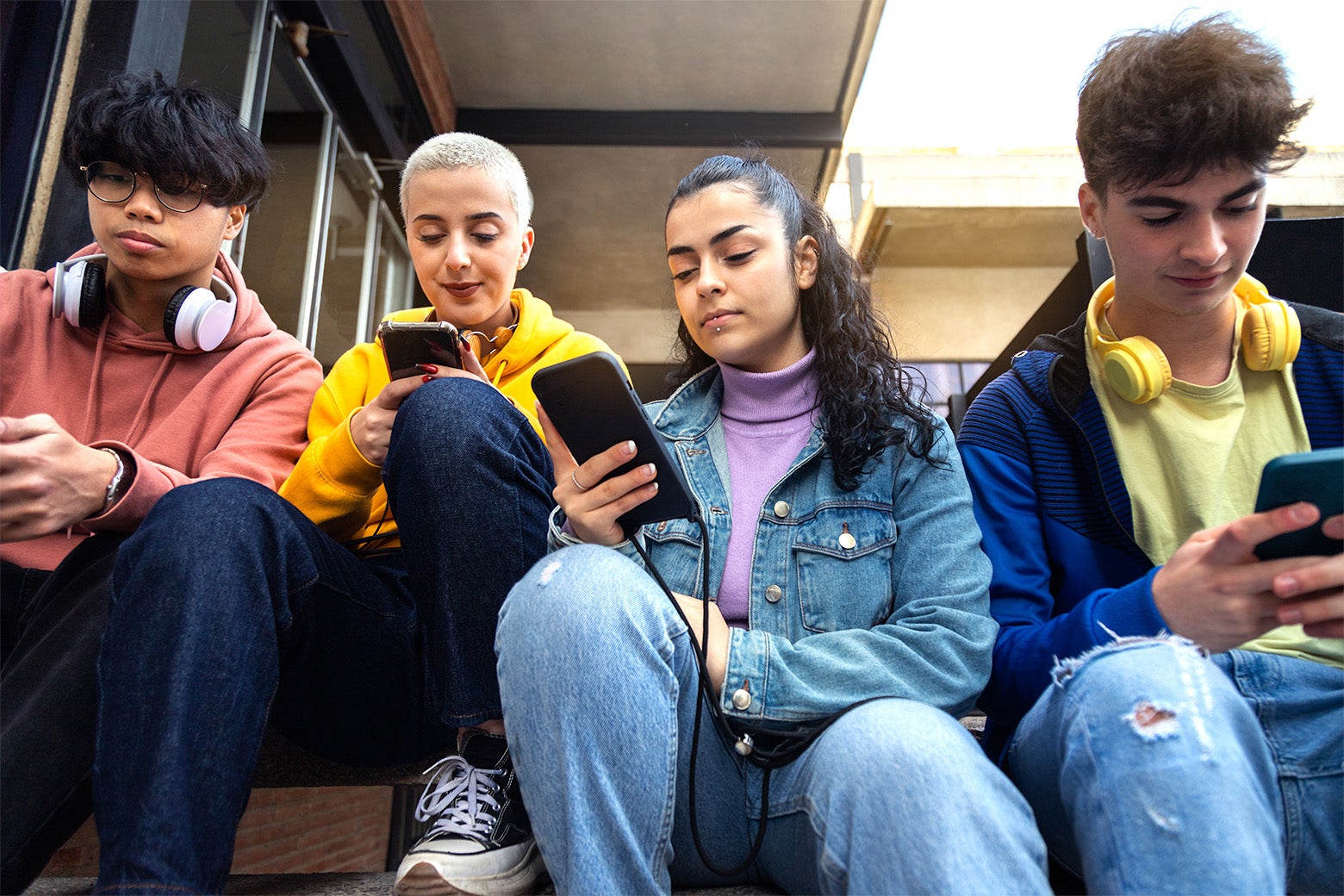On the issue of kids, smartphones, and social media, a vibe shift is happening, and it’s happening on the left, right, and in the center. Here’s a survey of recent anti-phone discourse on the topic in politics and culture in recent weeks and months: The TikTok “ban” (don’t call it that) garnered bipartisan support in the House, and Gov. Ron DeSantis signed a bill making it illegal for people under 14 to have social media accounts in Florida. “People are so unwilling to blame iPhones as one of the main culprits in a variety of social ills but graphs like [these] are revealing. It’s obviously the phones,” zillennial writer Magdalene Taylor tweeted, semi-virally, attaching that infamous “teens today aren’t hanging out” graph. Hosts of two podcasts enjoyed by Very Online left-ish millennials, TrueAnon and Time to Say Goodbye, devoted episodes to making freewheeling arguments against the use of social media by kids. (Tyler Austin Harper, a professor at Bates who has written for Slate, even suggested on the latter show that smartphones should be made illegal for use by people under 18. Tyler! A take!) A trend piece in the Daily Beast uncovered interviewees from Gen Z who said that when they had kids, they certainly wouldn’t be letting them be “raised by” iPads. “Get offline. It is not alcohol, it is not porn, it is not weed, it is not blah blah, it is being online. Get offline,” wrote a Reddit user on r/GenZ.
Not so long ago, the default position, if one were an internet-savvy older person beginning to feel queasy when noticing groups of kids bent over their phones, was to say to oneself, “Well, that’s life; once, Socrates feared print’s effect on memory, and now, I fear this.” One definitely didn’t say out loud, online, “The kids shouldn’t have phones,” unless one were writing for the Atlantic. A weary “it has always been thus” pose toward the topic was in order—television, Walkmans, rock music, the youths are always up to something the adults think is stupid. Some of the resistance to wagging a finger at kids and phones was a totally fair allergy to generational analysis; another part of it was probably self-defense. “Some of us really don’t like our screen time habits criticized,” Taylor wrote in a follow-up Substack analyzing the replies to her recent “it’s the phones” provocation on X. “Others may think they appear smarter by highlighting other issues, that they can see above the fray and observe the macro trends that are really shaping our lives, not that stupid anti-phone rhetoric we hear from the Boomers.” It’s not the phones; it’s the lack of third spaces, the omnipresent car culture, the inequality. That defensive pose? I know it well, because I was adept at it—in 2019 I described concern over teens and social media as “alarmist.”
Things are different in 2024. Yes, we have new data on the shape of the mental-health crisis among teens, and especially teenage girls, and how it’s worsened since phones got front-facing cameras and platforms became dominant. But the biggest shift doesn’t come from looking at new data; it’s from experience. More and more people have a boomer relative who was radicalized on Facebook, a grandma who won’t look up from her phone during family visits, or a Gen X partner adept at the art of phubbing. We, who are supposed to enjoy grown-adult levels of impulse control, have had trouble sleeping due to doomscrolling, spent Zoom meetings looking at Instagram, or gotten into weird fights with strangers on Reddit that derailed us emotionally for far too long. We, ourselves, with our developed brains, have felt like flies on sticky paper when it comes to social media; of course children, still forming their selves and navigating the pitfalls of pre-adulthood, may be affected by it too. “Kids probably shouldn’t have smartphones” has lost its generational sting. It has come to look more and more like common sense.
Into this apparently promising moment comes social psychologist Jonathan Haidt’s new book, The Anxious Generation: How the Great Rewiring of Childhood Caused an Epidemic of Mental Illness. Its compact thesis: We’ve overprotected kids IRL and underprotected them online. In the book’s first chapters, Haidt rearticulates a very familiar set of arguments about American kids’ lack of physical freedom. Playgrounds used to be more dangerous! Kids used to roam the woods! Why is everyone always at scheduled activities run by adults?! The kids never get a bruise or bump, and how will they learn to self-regulate this way? None of this will be new to anyone who’s kept up with popular parenting books in the past few decades. Haidt’s innovation lies in connecting this now-well-articulated picture of overprotected childhood with what happens when those same kids get on phones. The Anxious Generation, he hopes, will be part of a larger collective movement, one he is actively trying to incite by publishing a companion website full of evidence, discussion guides, and sample petitions, and funding billboards and public art in major cities. On his Substack, he wrote recently: “By the end of 2025, we will roll back the phone-based childhood.”
Kids, Haidt writes in prescriptive mode, need four things: more unsupervised play in childhood. No smartphones before freshman year in high school (flip or “dumb” phones and smartwatches are OK). No having a social media account of one’s own before the age of 16. (Haidt allows for the idea that kids will look at social media pages on a browser before then, which he argues is deeply different from having apps accessible 24/7 in your pocket and enmeshing yourself in the algorithm.) And no phones in schools. As in, locked up and turned off during school hours.
Haidt works his way around some of the most popular “it’s not the phones!” counterarguments. Why would an economic crisis in 2008, he asks, have hurt girls more than boys? (The data on girls’ mental health problems shows that they are doing worse than boys.) Why would Gen Z have reacted to the crisis of climate change by getting depressed, when, Haidt writes, “impending threats to a nation or generation do not historically cause rates of mental illness to rise”?
Some reviewers have reiterated these long-standing critiques. They call Haidt a digital absolutist and posit that demands for abstinence from smartphones will inevitably backfire (Tracy Dennis-Tiwary in the New York Times). They say that Haidt too casually dismisses the idea that our many rolling world crises could be a source of teen depression (Judith Warner in the Washington Post). From the conservative side, they say that maybe it’s actually increased awareness of mental health and access to therapy that’s causing the mental-health crisis (Carolyn D. Gorman in City Journal). Many venues, however, have been receptive to Haidt’s message.
I am now in the “it’s the phones” camp. I have been convinced. I am the mother of an elementary-aged non-phone-haver. I have every intention of putting off her phone-having using the framework Haidt identifies, if it’s at all possible to do. My husband, who would postpone her smartphone-and-social-media era until age 18 if he could, will go along. But I am still skeptical that, even given this overall shift toward worrying about phones, Haidt’s movement will really take hold.
One argument that Haidt makes is that we should practice letting our (appropriately aged) kids be away from us without knowing where they are, or having an easy way to contact them. He writes about his experience allowing his 13-year-old son to go to a nighttime U.S. Open game, traveling both ways alone on the subway. But on the way home, his son found out that a train he needed wasn’t running. The boy left the station to hail a cab, and got home fine—at 1 a.m.!
“From that day on,” Haidt writes, “he was a different person, with more confidence, and from that day on we treated him differently and gave him still more independence.” This, Haidt thought, was only possible because they had started off small, by letting him walk to school years before, and started “to trust him without tracking his blue dot at every moment.”
I told some colleagues with older kids about this story, and they quailed in shock. Tracking their kids’ iPhones, they said, was a source of solace to them. In Haidt’s view, the whole experience was proof that his kid can overcome challenges on his own, even get dis-routed and remain safe. But for many parents, a child, even a 13-year-old, making it home past midnight isn’t an argument for more freedom—it’s an example of why they keep tabs on their kids. Sure, there’s distance between “banning your kid from a smartphone” and “going to the U.S. Open alone.” But for the parents I did a gut check with, if the ability to call up an app during the school day and see that their children were right where they were supposed to be—or to check texts, or a child’s social media, for proof of life and safety—was available? They wanted it.
I get that concern. The minds of these parents are going to be hard to change. And a phone-free childhood is, as Haidt points out, a collective action problem. Just as kids may find it hard to be phone free if their friends aren’t, if every parent in a social group can follow their kid online this way, it can be hard to imagine giving up the ability to do so on purpose.
Yet, there is a reservoir of childhood and teenage experiences inside me, and inside many people who grew up pre-phone, that feels distant and beautiful, and that I do think helped me emerge into adulthood as a grounded, confident person. Days at the lake where we lost track of the time; long weekend afternoons wandering around Harvard Square with friends; nights my sister and I made snap decisions, after our shifts at Friendly’s ended, to go drive by the Dunkin’ Donuts and see if our pals were loitering in the parking lot across the street per usual. (They always were.)
I don’t know, of course, what it is like to worry about a middle schooler who isn’t home at the time they said they’d be. I know many parents—every parent?—wants their child to be able to explore the world on their terms, not spend their time jonesing for likes or working an algorithm. I am not sure if the new tide of concern about phones will be enough to defeat the feeling of closeness that they offer, the illusory sense of safety they have come to provide. But I hope Haidt succeeds in his movement to “roll back the phone-free childhood” by 2025. My own child turns 10 in 2027.

Alex Mitchell is your go-to expert for all things mobile. With a passion for the latest smartphones, apps, and mobile innovations, Alex provides in-depth reviews, insightful analyses, and breaking news about the ever-evolving world of mobile technology. Stay connected with Alex to navigate the fast-paced realm of mobile devices.


